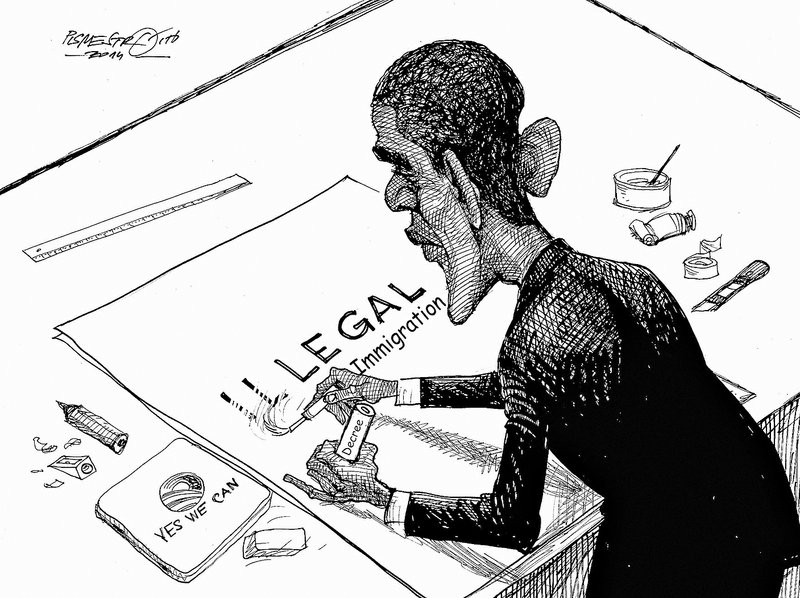You don't just tell tyrants when and where to stop. That's what makes them tyrants.
I don't think President Barack Obama is a tyrant because he bowed to reality on immigrants. He merely confirmed we're not going to kick 11 million people out of the country, something only a mighty tyrant could do. But lots of people disagree with me.
Where was all this concern for boundless power when he took us to war against ISIS? Why do we have a homeland spying system the old Soviet Union would have envied? What gives our head of state the right to kill pretty much anybody pretty much anywhere with a drone or special forces?
So let me get this straight. It's all right for our head of state to kill or torture foreigners outside our borders. At the same time, it's tyranny for him to show mild mercy to people already living here. So, just to be clear, he has the power of life or death outside of the country that elected him. He should wield no power within it, though. OK, I exaggerated, but I think the point's made.
No. It doesn't work that way.
Then-Speaker of the House Dennis Hastert came to Rogers in 2001. John Boozman was running for the U.S. House in a special election. Hastert spoke at the opening of Boozman's election headquarters. Everybody was in a good mood and Hastert took press questions. I asked one or two softball questions. After all, the event was just a glorified ribbon cutting. Hastert kept asking if there were any more questions. Finally, I obliged: "Does Congress just not declare war anymore?"
That question received applause. Congress was allowing the president to do pretty much anything he wanted to after 9/11. A sheepish Hastert replied that then-President George W. Bush wanted things that way.
I chose not to give the speaker of the U.S. House an elementary school civics lecture at the time. Perhaps that was a mistake. I should have said: The U.S. Congress' purpose is to make sure the head of state doesn't get everything his own way. That's why your office exists. It doesn't matter that this president leads your party.
I didn't ask my "war" question out of concern for legal formality or because I consider Section 8 of the U.S. Constitution sacrosanct. I asked because there can be no balance of power when there's no separation of powers.
The supposedly all-powerful president can't control the government when Congress doesn't do its job. Consider: An intelligence analyst tells an elected official "You need to kill this person or he might attack us someday." What is any elected official going to do? Suppose he lets the target live. Then the target may attack us someday. If so, somebody will leak to the press that the elected official could have had him killed. There's no penalty for killing a foreigner, though. So the order goes out. We're executing people for crimes they haven't committed yet just to be on the safe side.
Suppose, instead, that president said, "Look, we have an intelligence committee in Congress that's actually competent, engaged and holding me accountable. They control your budget. They're less concerned about making political hay out of Benghazi than the safety of the country. They don't have any more qualms about killing people to help their party than I do, but the people on the committee now actually know the difference between Shiite and Sunni, for instance. They're starting to wonder whether all this killing is creating more enemies than it's eliminating. After all, if these assassinations work so well at ridding us of threats, where did ISIS come from?"
One man in office alone can change nothing. If the Obama presidency has taught us anything, it's that. So when we invest that one man with supposedly limitless powers, what we're really doing is just setting up a figurehead for the government. It can then do whatever it wants.
We're reaping what we sowed with our panicky over-reaction to 9/11 -- and the Cold War, and Korea and Vietnam.
I don't believe the founding fathers were demigods. They were just people. They did have one mighty advantage over us, though, in designing a government. They'd actually fought tyranny. They knew its causes, its methods and its effects. Most important of all, they recognized tyranny when they saw it. It think we've lost that. I don't know how to get it back.
DOUG THOMPSON IS A POLITICAL REPORTER AND COLUMNIST FOR NWA MEDIA.
Commentary on 11/30/2014
